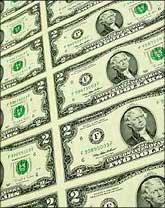They may well be, but investments in euro-denominated bonds will give higher safe returns, says Martin Feldstein.
 Chinese officials and private investors around the world have been worrying aloud about whether their dollar investments are safe. Since the Chinese government holds a large part of its $2 trillion of foreign exchange in dollars, they have good reason to focus on the future value of the greenback. And investors with smaller dollar holdings, who can shift to other currencies much more easily than the Chinese, are right to ask themselves whether they should be diversifying into non-dollar assets -- or even shunning the dollar completely.
Chinese officials and private investors around the world have been worrying aloud about whether their dollar investments are safe. Since the Chinese government holds a large part of its $2 trillion of foreign exchange in dollars, they have good reason to focus on the future value of the greenback. And investors with smaller dollar holdings, who can shift to other currencies much more easily than the Chinese, are right to ask themselves whether they should be diversifying into non-dollar assets -- or even shunning the dollar completely.
The fear about the dollar's future is driven by several different but related concerns. Will the value of the dollar continue its long-term downward trend relative to other currencies? Will the enormous rise of the US government's debt that is projected for the coming decade and beyond lead to inflation or even to default? Will the explosive growth of commercial banks' excess reserves cause rapid inflation as the economy recovers?
But, while there is much to worry about, the bottom line is that these fears are exaggerated. Let's start with the most likely of the negative developments: A falling exchange rate relative to other currencies. Even after the dollar's recent rally relative to the euro, the trade-weighted value of the dollar is now 15 per cent lower against a broad basket of major currencies than it was a decade ago, and 30 per cent lower than it was 25 years ago.
Although occasional bouts of nervousness in global financial markets cause the dollar to rise, I expect that the dollar will continue to fall relative to the euro, the Japanese yen, and even the Chinese yuan. That decline in the dollar exchange rate is necessary to shrink the very large trade deficit that the US has with the rest of the world.
Consider what a decline of the dollar relative to the yuan would mean for the Chinese. If the Chinese now hold $1 trillion in their official portfolios, a 10 per cent rise in the yuan-dollar exchange rate would lower the yuan value of those holdings by 10 per cent. That is a big accounting loss, but it doesn't change the value of the American goods or property investments in the US that the Chinese could buy with their trillion dollars.
The Chinese (or Saudis or Indians or others outside the euro zone) should, of course, be concerned about the dollar's decline relative to the euro. After all, when that decline resumes, their dollar holdings will buy less in European markets. While it is hard to say how much the decline might be, it would not be surprising to see a fall of 20 per cent over the next several years from the current level of about $1.4 per euro.
But the big risk to any investor is the possibility that inflation will virtually annihilate a currency's value. That happened in a number of countries in the 1970s and 1980s. In Mexico, for example, it took 150 pesos in 1990 to buy what one peso could buy in 1980.
That is not going to happen in the US. Large Budget deficits have led to high inflation in countries that are forced to create money to finance those deficits because they cannot sell longer-term government bonds. That is not a risk for the US. The rate of inflation actually fell in the US during the early 1980s, when the US last experienced large fiscal deficits.
Federal Reserve Chairman Ben Bernanke and his colleagues are determined to keep inflation low as the economy recovers. The Fed has explained that it will sell the large volume of mortgage securities that it now holds on its balance sheet, absorbing liquidity in the process. It will also use its new authority to pay interest on the reserves held by commercial banks at the Fed in order to prevent excessive lending. This is, of course, a formidable task that may have to be accomplished at a time when the Congress opposes monetary tightening.
Looking forward, investors can protect themselves against inflation in the US by buying Treasury Inflation-Protected Securities (TIPS), which index interest and principal payments to offset the rise in the consumer price level. The current small difference between the real interest rate on such bonds (2.1 per cent for 30-year bonds) and the nominal interest rate on conventional 30-year Treasury bonds (now 4.6 per cent) implies that the market expects only about 2.5 per cent inflation over the next three decades.
So, the good news is that dollar investments are safe. But safe doesn't mean the investment with the highest safe return. If the dollar is likely to fall against the euro over the next several years, investments in euro-denominated bonds issued by the German or French governments may provide higher safe returns. Even if the dollar is perfectly safe, investors are well advised to diversify their portfolios.
The author is a professor of economics at Harvard, was chairman of President Ronald Reagan's Council of Economic Advisors and president of the National Bureau for Economic Research.









 © 2025
© 2025